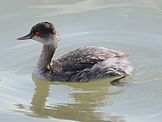Wikipedia:Today's featured article/March 17, 2024
The black-necked grebe (Podiceps nigricollis) is in the grebe family of water birds. During the breeding season, the head, neck, and breast are dark, with some yellow behind the eyes; the flanks are tawny rufous to maroon-chestnut; and the abdomen is white. The non-breeding bird has greyish flanks and no yellow feathers. This species is present in parts of Africa, Eurasia, and the Americas. It catches insects on the surface of the water, in flight, or occasionally on foliage, and dives to catch crustaceans, molluscs, tadpoles, and small frogs and fish. It makes a floating cup nest on an open lake, in which three or four eggs hatch after a 21-day incubation period. After about 10 days, the parents divide the brood between themselves, and after roughly 10 more days, the chicks become independent. The black-necked grebe travels as far as 6,000 kilometres (3,700 mi) during migration, in the course of which it pauses to moult. (Full article...)
